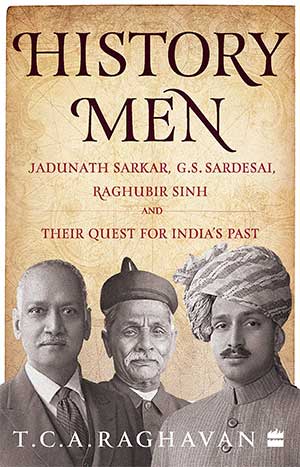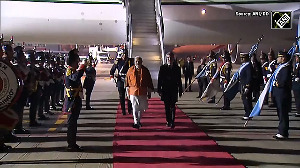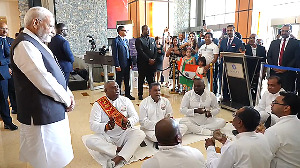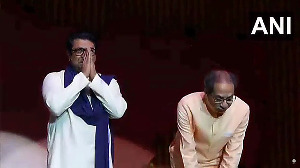An illuminating excerpt from T C A Raghavan's History Men: Jadunath Sarkar, G S Sardesai, Raghubir Sinh And Their Quest For India's Past.

Jadunath Sarkar's histories are gripping, the way he recreates the drama surrounding important historical events.
In doing so he was associating scholarly treatment with popular historical imagination in a manner perhaps not equalled since in India.
Sarkar did so both with events and situations that already exercised a powerful hold on popular culture, but also traced forgotten episodes, fleshed them out with personalities and embedded them into his main narrative.
Sarkar's treatment of two episodes concerning the life of Shivaji stands out as classic examples of this process.
The encounter of Shivaji with the Bijapur general Afzal Khan in 1659 and his visit to the Mughal court at Agra in 1666 are dramatic episodes of seventeenth century history that had captured the popular imagination of Maharashtra and India in the late nineteenth and early twentieth centuries.
In 1659, the prominent Bijapuri nobleman, Afzal Khan, was assigned the task of militarily defeating Shivaji.
He embarked on the task by provisioning a large force and '... determined to make war pay for war, by carrying out rapid cavalry raids' on well endowed temples en route from Bijapur to the Maratha strongholds.
But the task was by no means an easy one for the Bijapur army: 'Shiva's military strength was far from despicable; and the Bijapuri nobles shrank from the idea of a campaign among the hills and jungles of the Western Ghats.' Afzal Khan on his part also '... felt that the heavy cavalry who formed the spearhead of his army would lose their superiority among the hills and forests'.
On the other hand, '... the news of Afzal's coming had caused great terror and perplexity among Shiva's followers. ... Here was their first encounter with the regular forces of Bijapur, led by a famous general and numbering 10,000 horsemen with artillery, transport and all the other materials of the best equipped armies of that age.'
Shivaji's followers, therefore, '... urged him to make peace as the enemy was too strong and hostilities would only cause a great loss of life to their side'.
Both sides agreed to a meeting and '... the place chosen for the interview was the crest of an eminence, below the fort of Pratapgarh'.
The meeting ended with the killing of Afzal Khan by Shivaji on November 10, 1659, and the subsequent routing of his army in disarray.
Jadunath Sarkar wrote about Afzal Khan's country seat of Afzalpura, a suburb of Bijapur, on the basis of a visit in 1916:
The tragic fate of Afzal Khan has most profoundly stirred the popular imagination in his own country and in that of his enemy.
At his village of Afzalpura ... the gloomy legend sprang up that before starting on this fatal expedition, he had a premonition of his coming end and killed and buried all his 63 wives.
The peasants still point to the ... 63 tombs, of the same shape, size and age standing close together in regular rows. ... Utter desolation has settled on the spot.
Where his mansion once stood with its teeming population, the traveller now beholds a lonely wilderness of tall grass, brambles and broken buildings, the fittest emblem of his ruined greatness.
Sarkar wrote about this event conscious of its larger-than- life character:
'Among the Marathas the destruction of Afzal Khan caused the wildest exultation; it marked the dawn of their national independence. ...
The incident caught hold of the public imagination of Maharashtra as the most glorious event in the history of the race ...
Ballads were composed [where] ... short ringing lines ... almost reproduce the tramp of the soldiery, the journeys of the rival chiefs, their meeting, the exchange of abuse, the death grapple, the battle and the triumph of the Maratha army. ...
To the Marathas the fight with Afzal has always appeared as at once a war of national liberation and a crusade against the desecrator of temples.
The question Sarkar addressed was limited, but nevertheless a charged one: 'Was the slaying of Afzal Khan a treacherous murder or an act of self-defence on the part of Shivaji?'
And, 'Who struck the first blow?'
A foundational history of an earlier generation -- the British official James Grant Duff's History of the Marathas (1818) --- had concluded that Afzal Khan's killing was no more than treacherous and premeditated murder.
Justice M G Ranade's The Rise of Maratha Power (1900) did not challenge this conclusion even though the thrust of his own history was meant to correct Duff's distortions of Maratha history.
But the Afzal Khan episode most dramatically entered the nationalist mainstream at the turn of the nineteenth century when Bal Gangadhar Tilak, the nationalist leader and journalist, published in June 1897 an article with a justification of Shivaji's killing of Afzal Khan.
This was based on the philosophy of the Bhagvad Gita that with benevolent intentions he murdered Afzal Khan for the good of others:
'Do not circumscribe your vision like a frog in a well; get out of the penal code and enter the atmosphere of the Bhagvad Gita.'
A week later, two British officials were shot dead in Poona by some young men -- and the government took the view that the assassination was the consequence of Tilak's incitement and he was convicted of sedition.
Apart from these nationalist hues, the Afzal Khan episode had acquired a communal Hindu-Muslim dimension that grew steadily over the twentieth century and has continued to this day.
An illustration of this is provided by the angry response in the 1930s to Jawaharlal Nehru's description of the incident in Glimpses of World History: 'With his [Shivaji's] enemies he was prepared to adopt any means, good or bad, provided that he gained his end.
He killed a general sent against him by Bijapur by treachery. ... Some of Shivaji's deeds, like the treacherous killing of the Bijapur general, lower him greatly in our estimation.'
These sentences had resulted in a controversy, especially in the Marathi press and T R Deogirikar, the editor of a Marathi journal and a leading Congress party member of Maharashtra had thereafter referred Jadunath Sarkar's research on the subject to Nehru.
'I am very glad,' wrote Nehru thereafter to Deogirikar in March 1936, 'that you have written to me on the subject and given me extracts of books which go to show that my statement was wrong.
This is a matter of special pleasure to me as I have always been distressed at the thought that Shivaji should have been accused of improper behaviour.'
Sarkar distanced himself from all larger interpretations and implications of his research into the Shivaji-Afzal Khan contest, and in the communally supercharged times when his Shivaji appeared (1919) and its subsequent revised editions (second in 1920, third in 1928, fourth in 1948 and fifth in 1952), this was no small achievement.
For many admirers of Shivaji, the book itself administered a 'mixed shock' as recalled by K R Qanungo later: At least a little of the anger at Sarkar's dispassionate and therefore often critical comments on Maratha history was diluted at the absolving of Shivaji of bad faith in the Afzal Khan episode.
'Public indignation ... was no doubt allayed to some extent, and the Maratha rejoiced at Jadunath's irrefutable logic clenched with facts in clearing Shivaji of the charge of murder of an invited guest'.
Sarkar's own judgement on the Afzal Khan episode was arrived at by a careful distillation of all the extant source material he could lay his hands on:
The old Maratha chronicles (as distinct from the English educated apologists of the national hero) all assert it was Afzal.
These genuine old historians never shrink from charging Shivaji with murder or treachery whenever they know him to have been really guilty.
They wrote long before Grant Duff's book had roused public indignation against Shivaji's murder of an invited guest.
It is, therefore, impossible to contend that the story of Afzal having struck the first blow was an invention of the modern Marathas after English education had weakened their conscience to the wickedness of pre-meditated political murders.
After evaluating a wide range of extant sources, Sarkar concluded: 'The weight of recorded evidence as well as the probabilities of the case supports the view that Afzal Khan struck the first blow and Shivaji only committed a ... "preventive murder".
It was ... a case of "diamond cut diamond".'
This is Sarkar at his classical best: Dispassionate and objective even as he immersed himself into a debate that was as divisive as he wrote and as it has remained since.

Excerpted from History Men: Jadunath Sarkar, G S Sardesai, Raghubir Sinh And Their Quest For India's Past by T C A Raghavan, with the kind permission of the publishers, HarperCollins India.











